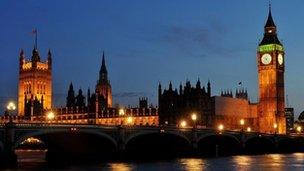England-only laws 'need majority from English MPs'
- Published

Westminster law-making has come to focus on England, says Sir William McKay
Legislation that affects just England should normally need backing by a majority of MPs who represent English constituencies, a report says.
The McKay Commission said such a principle should be enshrined in a resolution of the House of Commons.
The commission was launched last year to consider whether Welsh, Scottish and Northern Irish MPs should be denied a vote on English-only matters.
The government said it would give the report "serious consideration".
But the English Democrats, who campaign for a separate parliament for England, called the proposals a "fudge" which failed to address "the real issue" of creating equal democratic rights across the UK.
There has been controversy over the so-called West Lothian Question - the ability of Welsh, Scottish and Northern Irish MPs to vote on England-only matters - for several decades, but this intensified after devolution.
In 2004, support from Scottish and Welsh MPs allowed the government to push through the introduction of university top-up fees in England.
'Double lock'
The commission concluded that the current situation was "unsustainable" and changes were needed.
It proposed the principle that Commons decisions with a "separate and distinct effect" for England should "normally be taken only with the consent of a majority of MPs sitting for constituencies in England".
The same would apply for decisions that affected only England and Wales.
The report said the principle should be enshrined in a resolution of the House, and suggested a range of procedural changes to entrench the approach.
Specific parliamentary time could be allocated to debating plans for England, and MPs would be given an opportunity to vote on motions endorsing or rejecting them.
Committees for scrutinising bills could also be weighted to represent the party balance in England, the report suggested.
However, the commission dismissed as "flawed and impractical" a more drastic suggestion, which would require England-only legislation to get a majority of English MPs, as well as an overall majority.
Instead of such a "double lock", the commission floated the idea of a "double count", where the proportion of English MPs supporting a Bill would be published alongside the overall result.
"If a government was seen to have failed to attract the support of a majority of MPs from England [or England and Wales] for business affecting those interests, it would be likely to sustain severe political damage," it says.
'Important issue'
Commission chairman Sir William McKay said Westminster law-making had inevitably come to focus on England, or England and Wales.
"But the processes for making law at Westminster have not significantly changed," he said.
"Surveys have shown that people in England are unhappy about the existing arrangements and support change.
"There is a feeling that England is at a disadvantage, and that it's not right that MPs representing the devolved nations should be able to vote on matters affecting England.
"The status quo clearly cannot be sustained."
A Cabinet Office spokesman said the government was "very grateful to Sir William McKay and his colleagues for their work".
"This is a very important issue, which is why the government asked this expert commission to look into it.
"We will give the report very serious consideration before we respond substantively," he said.
English Democrats chairman Robin Tilbrook said: "The commission was set up to come up with a fudge and that is what it has done. It fails to address the real issue.
"The issue isn't how the House of Commons works. It is that Scotland, Wales and Northern Ireland have their own parliaments and governments and England does not. We need a democratic government and parliament for England."
- Published24 July 2012
- Published17 January 2012
- Published17 January 2012
- Published8 September 2011